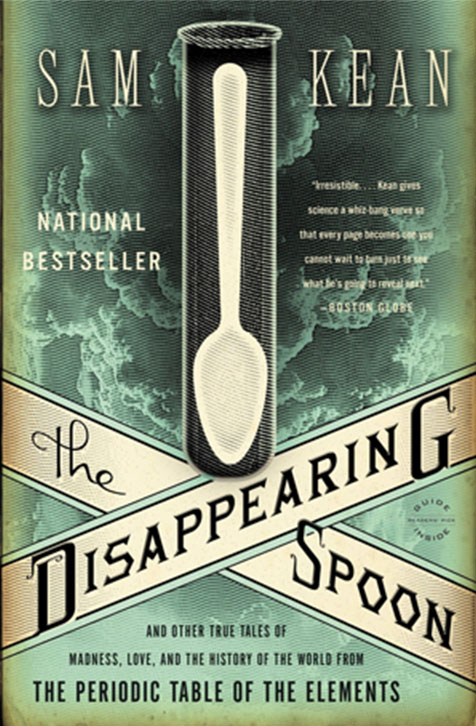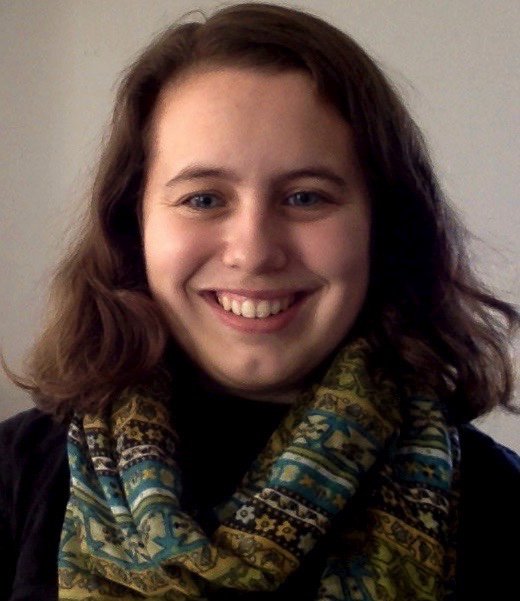There's Antimony, Arsenic, Aluminum, Selenium...
5:19 AM
Summary of The Disappearing Spoon: And Other True Tales of Madness, Love, and the History of the World from the Periodic Table of Elements By Sam Kean
The periodic table of elements is one the most important scientific achievements. Spanning hundreds of years, the history of the elements and how they've been discovered and used by humans features tales of poisons, medical miracles, obsession, betrayal, and progress. From iodine, to radium, to gallium, to thorium, and each one in between, this book explores all the elements and the scientists who devoted their lives to them.
Review
This is a first for me. I've never read and reviewed a nonfiction book before because, well, I'm a fiction loving gal at heart. I love learning about new things, but, when it comes to reading for pleasure, there's nothing quite like escaping into a fantasy world.
I first saw The Disappearing Spoon in the gift shop of Chicago's Museum of Science and Industry (one of my all-time favorite museums I've visited. If you haven't been, I highly recommend it). At the time, the title intrigued me but not enough for me to buy it then and there, though, to be fair, I rarely pick up a book I haven't read and immediately buy it. I am more the type of person who will check a book out from the library three or four times and then buy it because I'm sure I like the book.
Anyway, I made it a goal of mine a few months ago to read more nonfiction books. To that end, I plan that for every ten books I read one of them will be non fiction. So, The Disappearing Spoon has the honor of being my first non fiction book I've read for pleasure.
Since I'm not entirely certain how to review a nonfiction book (for instance, how do you avoid spoilers when almost everything in the book is something most people wouldn't know without reading it?), I'm going to talk in broad terms about what I liked about this book. As a story person, I loved reading all of the stories behind how different elements were discovered and used, and the harmful effects some of them can have. Some of my favorite parts of the book were the chapter on poisons, the amusing tale about the disappearing spoon (where the title of the book comes from), and the life stories of women scientists. The author, Sam Kean, also did a good job of explaining everything so that I, someone who is not a chemist and only has a high school level understanding of elements and how they interact with each other, could understand and appreciate the science behind the elements. The only time I got a little lost was when he started talking about Einstein and the uncertainty principle of quantum mechanics.
Some of the chapters I found to be more interesting than others. I could've skipped the chapter on how elements have affected design. I couldn't care less about an expensive, fancy looking pen and what element was used to skyrocket it to fame.
I read this book periodically (sorry, couldn't resist the pun). Reading non fiction is different from reading fiction. It took me longer to finish this book than it takes me to read most fiction books. As I mentioned before, I like going to museums and learning new things, but at a museum I do it in chunks. If an exhibit doesn't interest me, I move on to the next one. So, it's no surprise that I spread out my reading of this book, though I did try to read the chapters in order and not skip around (you can get by fine, in my opinion, if you do choose to mix up the order in which you read the chapters). As for the goal of non fiction reading, learning something new, this book was a success. Granted, I might not retain all of the information--anyone who can remember all the different elements and stories in this book would have quite the impressive memory--but I will remember a few of the interesting stories and be able to regale them to anyone I meet.
I'll leave you with a song by the great Tom Lehrer.
If you have any nonfiction books you think I'd enjoy, please comment below with the title and author.
Up Next
The next book on my list is Liesl and Po by Lauren Oliver.











2 comments
Hmm, I'm more a fan of narrative nonfiction (and if you're reading nonfiction and you haven't read Nothing to Envy by Barbara Demick, you honestly ought to. One of the best books I've ever read, and a stunningly heartbreaking and realistic portrayal of North Korea.) But I do quite like science, and this sounds extremely interesting.
ReplyDeletePS: Your bio at the end of the post seems to be malfunctioning? Might want to see if you can tweak that.
Thanks, Alyssa! I'll be sure to add Nothing to Envy to my reading list.
ReplyDeleteI know the bio at the end of the post is screwed up:( I am new to blogging and coding and have been trying to fix it but have so far been unsuccessful. I downloaded a free Blogger template and was able to edit everything else to my own information with the exception of the bio. If you have any ideas of how to fix it, I would greatly appreciate it!